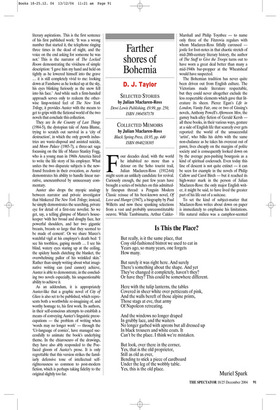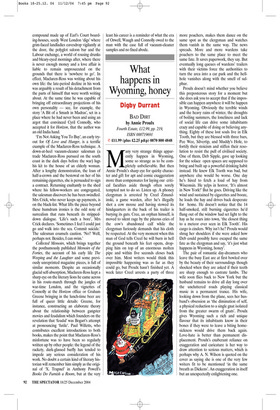Farther shores of Bohemia
D. J. Taylor
SELECTED STORIES by Julian Maclaren-Ross Dewi Lewis Publishing, £9.99, pp. 250, ISBN 1904587178 COLLECTED MEMOIRS by Julian Maclaren-Ross Black Spring Press, £8.95, pp. 440 ISBN 0948238305 Four decades dead, with the world he inhabited no more than a detour on the Soho tourist trail, Julian Maclaren-Ross (1912-64) might seem an unlikely candidate for revival. Curiously enough, the past few years have brought a series of twitches on this admittedly finespun thread: a Penguin Modern Classic reissue of his best-known novel, Of Love and Hunger (1947), a biography by Paul Willetts and now these spanking selections from a vast and probably unreconstitutable oeuvre. While Tambimuttu, Arthur Calder Marshall and Philip Toynbee — to name only three of the Fitzrovia regulars with whom Maclaren-Ross fitfully caroused jostle for foot-notes in that chaotic stretch of mid-20th-century literary history, the author of The Stuff to Give the Troops turns out to have worn a great deal better than many a mid-1940s bar-propper at the Wheatsheaf would have suspected.
The Bohemian tradition has never quite been driven out from English culture. The Victorians made literature respectable, but they could never altogether exclude the less respectable elements which gave that literature its sheen. Pierce Egan’s Life in London, Vanity Fair, one or two of Gissing’s novels, Anthony Powell’s Afternoon Men, the gamey back-alley fiction of Gerald Kersh all these books, in their various ways, gesture at a side of English life that scarcely ever gets reported: the world of the unsuccessful ‘artist’, who bilks his debts with the same non-chalance as he takes his overcoat out of pawn, lives cheaply on the margins of polite society and is consequently looked down on by the average pen-pushing bourgeois as a kind of spiritual cockroach. Even today this line of descent is not quite extinct — it can be seen for example in the novels of Philip Callow and Carol Birch — but it reached its high-water mark in the person of Julian Maclaren-Ross: the only major English writer, it might be said, to have lived the greater part of his life out of a suitcase.
To set the kind of subject-matter that Maclaren-Ross writes about down on paper is immediately to emphasise his limitations. His natural milieu was a camphor-scented compound made up of Earl’s Court boarding-houses, seedy West London ‘digs’ where grim-faced landladies eavesdrop vigilantly at the door, the polyglot saloon bar and the Labour exchange, a world of rousing drunks and bleary-eyed mornings after, where there is never enough money and a love affair is liable to remain unprosecuted on the grounds that there is ‘nowhere to go’. In effect, Maclaren-Ross was writing about his own life: the late-period decline in his work was arguably a result of his detachment from the parts of himself that were worth writing about. At the same time he was capable of bringing off extraordinary projections of his own personality — see, for example, the story ‘A Bit of a Smash in Madras’, set in a place where he had never been and using an argot that convinced Cyril Connolly, who accepted it for Horizon, that the author was an old India hand.
‘I’m Not Asking You To Buy’, an early tryout for Of Love and Hunger, is a terrific example of the Maclaren-Ross technique. A down-at-heel vacuum-cleaner salesman (a trade Maclaren-Ross pursued on the south coast in the dark days before the war) lugs his kit to the house of an elderly woman. After a lengthy demonstration, the loan of half-a-crown and the bestowal on her of his remaining cigarettes, she is persuaded to sign a contract. Returning exultantly to the shed where his fellow-workers are congregated, the salesman discovers he has been swindled. Mrs Crick, who never keeps up payments, is on the black-list. What lifts the piece beyond these humdrum ironies is the odd note of surrealism that runs beneath its strippeddown dialogue. ‘Life’s such a bore’, Mrs Crick declares. ‘Sometimes I feel I could just go and walk into the sea. Commit suicide.’ The salesman counsels caution. ‘No? Well, perhaps not. Besides, I can swim.’ Collected Memoirs, which brings together the posthumously published Memoirs of the Forties, the account of his early life The Weeping and the Laughter and some previously unreprinted magazine pieces, is full of similar moments. Despite an occasionally glacial self-absorption, Maclaren-Ross kept a sharp eye on the literary lions he came across in his route-march through the jungles of war-time London, and the vignettes of Connolly at the Horizon office or Graham Greene bringing in the lunch-time beer are full of queer little details: Greene, for instance, constructing an elaborate theory about the relationship between gangster movies and feudalism which founders on the revelation that ‘feudal’ was Bogart’s attempt at pronouncing ‘futile’. Paul Willetts, who contributes excellent introductions to both books, makes the point that Maclaren-Ross’s misfortune was to have been so regularly written up by other people: the legend of the rackety, dark-glassed barfly has tended to impede any serious consideration of his work. No doubt a certain kind of literary historian will remember him simply as the original of ‘X. Trapnel’ in Anthony Powell’s Books Do Furnish a Room, but at the very least his career is a reminder of what the era of Orwell, Waugh and Connolly owed to the man with the case full of vacuum-cleaner samples and no fixed abode.


















































































 Previous page
Previous page